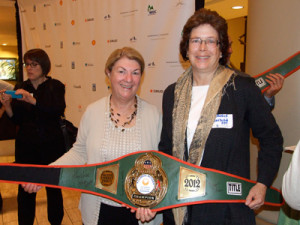
Fall 2015 Leaflet
POLICY
From California to the Globe
LEVERAGING FORESTS FOR A SAFER CLIMATE
In 1992, world leaders affirmed the global risk of climate change and their intent to address it. They created the United Nations Framework Convention on Climate Change (UNFCCC), an international environmental treaty to stabilize atmospheric greenhouse gas concentrations, limiting the rise of average global temperatures. In 1997, the Kyoto Protocol extended the UNFCCC and defined how countries would do this. A core action of the Kyoto Protocol called for protecting and enhancing forest carbon sinks, promoting conservation, sustainable management, and reduced deforestation.
Unfortunately, in the intervening years, the targeted limits to the rise of carbon dioxide emissions were all exceeded. Now, average global temperatures are expected to increase by more than four times the limits set by UNFCCC and the Kyoto Protocol. There is one major exception to this trend: California. In 2006, California undertook binding emissions reductions through its landmark climate law AB 32—the Global Warming Solutions Act. The state is on track to reduce its emissions to 20% below its 1990 emissions levels by 2020. The state is also developing the implementation pathway to reach even more impressive targets for 2030: 40% below 1990 levels.
California was the first state globally to include the protection of standing, managed forests in its climate policy and the first to develop state-sanctioned, scientifically- based, standardized, 3rd party verified protocols for forest carbon offset projects. Pacific Forest Trust pioneered that effort. Offsets now cover over 2 million acres of forests in 22 states, helping meet that 2020 goal. California is also the first state to develop broad, sector-based approaches to reducing net carbon emissions and increase net sequestration through forests and other natural lands. Forests are the pivotal mechanism that will help achieve these new 2030 emissions reduction goals.

Pictured above: Pacific Forest Trust President, Laurie Wayburn (right), and Board Member, Andrea Tuttle (left), accepting the Climate Action Champion Award from the Climate Action Reserve.
This December, world leaders, scientists, policymakers, and climate change activists will gather in Paris, France, for the annual UNFCCC meeting. This conference presents a historic opportunity to develop a successor approach to the Kyoto Protocol. As the safest and most expandable carbon sinks, forests will play a major role in the new approach. PFT President, Laurie Wayburn, and Board Member, Andrea Tuttle, will be in attendance to advocate for the essential role forests play to mitigate climate change.
One key topic during the climate conference will likely be the approval of the Reduced Deforestation and Forest Degradation (REDD+) plan which outlines a new mechanism to work with forests in emerging economies, especially in tropical forests. California will also likely signal its intent to open its carbon market to REDD+ projects that meet its standards for regulatory compliance offsets, expanding the role forests play in ensuring a safer climate.
